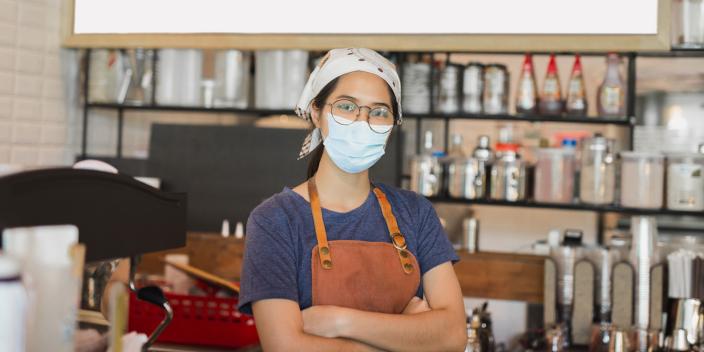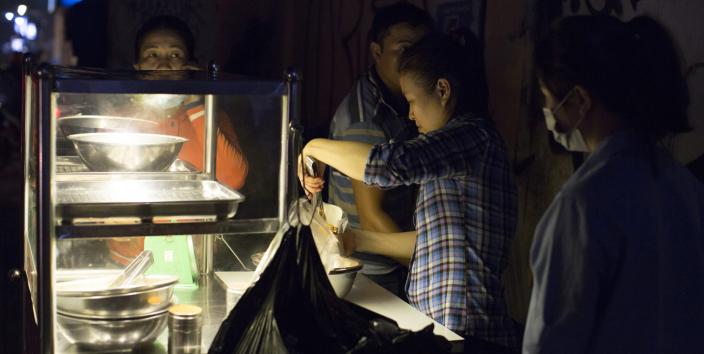The outbreak of COVID-19 poses significant threats and challenges to Southeast Asia and its regional Association of Southeast Asian Nations (ASEAN) bloc, as it has impacted all sectors from health to the economy. In order to deal with this unprecedented event, on April 14, 2020 the ASEAN leaders adopted a Declaration of the Special ASEAN Summit on COVID-19. In the declaration, the member-states of ASEAN committed to strengthen cooperation in public health measures, as well as continued cooperation in ensuring the provision of medicines, medical supplies, and equipment. Open trade was called for, and the establishment of a COVID-19 ASEAN Response Fund was proposed to ensure the smooth flow of medical supplies, food, and essential goods.
Is this response sufficient?
COVID-19 has disproportionately impacted minority groups and vulnerable communities across all ASEAN member-states. This is why Oxfam International’s paper recommending policy interventions specifically for micro, small, and medium enterprises (MSMEs) is timely and welcome. For economic recovery to be inclusive and sustainable, support measures must be in place for those severely affected.
Immediate support for MSMEs is vital to enterprise security and true economic resiliency.
It is, indeed, laudable that an environment conducive for MSMEs be created, especially in ensuring that adaptation and resumption of business operations is possible. In the implementation of this policy recommendation, it would be good to show how governments can improve trade flows and facilitate safe and sustainable business re-opening. Assistance, either in the form of capital funding or subsidies, should be provided to MSMEs in order to continuously meet their lease obligations, provide accurate tests to all employees on a regular basis, disinfect the premises, and procure the necessary protective equipment for their staff. Further and should government subsidies be difficult to undertake, regulation providing for a robust public and private financing program with simplified requirements, at zero or minimal interest rates, and with negotiable grace periods be enacted – whether as a commitment on a regional level or by each ASEAN member-state.
MSMEs should be given a more prominent role in the value chain, as consumers are now directly sourcing their needs from domestic or even hyperlocal sources. The agriculture sector stands to gain and expand should there be a policy shift to promote hyperlocal value chain sourcing or purchasing from one’s own neighborhood or community, improving the sustainability of businesses without constant access to logistics and mobility.
With regard to big businesses, and while larger corporations have indeed crowded out MSMEs for resources and capital, all enterprises can survive and adapt if the former allocates a portion of their supply chain requirements to MSMEs. Ideally, governments should also allocate a portion of their procurement of goods and services to MSMEs.
Moreover and while digitization has indeed created avenues for creating and sustaining markets, coherence and cooperation are required to make e-commerce and logistics accessible to MSMEs. Perhaps the proposal to create an ASEAN online marketplace for MSMEs should be revisited and prioritized.
Finally and most importantly, the thrust for and trend toward digitization can also be an impetus for improving government services, particularly on the ease of doing business for MSMEs. Permits, licenses, and tax payment should be made easy and accessible to enterprises. All told, policy changes need to be made to assist and revitalize MSMEs in an age where enterprise security is a critical issue. Logistics and supply infrastructure must be strengthened so that these are accessible to MSMEs.
In implementing the proposed recommendations for ASEAN member-states, focus should be given on female employees and women-owned or led businesses.
The year 2020 marks the 25th anniversary of the Beijing Platform for Action, but instead of celebrating a ground-breaking year for gender equality, the pandemic has further exposed and deepened the pre-existing inequalities and vulnerabilities of women in social, political, and most especially, economic systems. In drafting a policy response to COVID-19, it is imperative that aside from a long-term vision of gender mainstreaming mentioned in the paper, immediate responses and short-term measures should be strategized with a gender lens.

The Progress Report on Women’s Rights and Gender Equality, released by the ASEAN Commission on the Promotion and Protection of the Rights of Women and Children, concluded that women dominate vulnerable employment in the ASEAN. In seven out of 10 ASEAN member-states for which there are available data, the share of women employed exceeds that of men.
Women workers and women-owned MSMEs are more heavily engaged than their male counterparts in travel, recreation, hospitality, and retailing. These major sectors and their supply chains are hardest-hit by pandemic defensive measures, and their recovery will likely be of extended U rather than V shape. In addition, women comprise the majority of health and social-care workers in the fight against COVID-19, but they are also struggling to find child-minding and schooling services while doing dangerous frontline work.
Worse, the responsibilities of both working and at-home women, who carry out three times more unpaid (child and elderly) care and household chores than men, have become much heavier through increased domestic violence and pressures, from supervising home schooling and taking care of relatives with the virus, and in rapidly aging and aged societies. Between 2000 and 2030, persons aged 65 and over will double to 10% of the population in Indonesia, Malaysia, the Philippines, Thailand, and Vietnam, and to 18% in East Asian countries.
It is not surprising that the pandemic has exposed and exacerbated, among others, gender-based social and economic inequalities and disparities within and across countries, including those in ASEAN. Border closure, domestic lockdown, and social distancing, including school shutdown, to safeguard public health and well-being have generated disproportionate and unintended job losses and other shocks borne by women (including girls).
In implementing a gendered COVID-19 MSME response, there is a need to create an environment where enterprises and families support and practice equal sharing of care work to ease the “double burden” of women who work from home and who work for the home. Policy crafting and support programs with a gendered perspective will go a long way in empowering women. Notable examples include the following:
- In Tunisia and Timor Leste, technical assistance from gender experts were deployed to assist the government and line ministries to ensure the protection and promotion of women.
- In Vietnam, UN Women and UNICEF work with the Ministry of Labour, Invalids, and Social Affairs to develop codes of conduct and safeguarding measures for women and children in quarantine centers set up as a result of the COVID-19 outbreak.
- The Child Care Centre Act of Malaysia providing for standards and regulations for child care and recently provided a subsidy of RM 250 per month for each child who is sent to a private registered child care center for parents with a per capita income below RM 500 (urban), RM 400 (suburban), and RM 300 (rural). Child care, coupled with a reskilling program by the government, truly lifts women’s double burden and allows for proper utilization of female talent in the workforce, and for the returnees who left.
- In the Philippines, a project entitled “Inclusive Lending for Aspiring Women Entrepreneurs” or “ILAW”, translated as “light”, truly provides illumination for women-owned and led enterprises. The Development Bank of the Philippines or DBP provides a dedicated loan facility to women when traditional financing has failed or judged them.
- Also in line with the efforts of the Philippine government to rebuild and expedite the recovery process in calamity stricken areas, DBP launched the “Rehabilitation Support Program on Severe Events” or “RESPONSE” to provide credit assistance for rehabilitation.
- The #SheTrades initiative of the International Trade Centre is likewise a good initiative in providing assistance and access to the supply chain and logistics to women-led and owned businesses.

Similar to the recommendations for assistance to MSMEs in the shift to digitization, a gendered response needs to be crafted in order to bridge the digital divide between women workers and entrepreneurs vis-a-vie their male counterparts, who are more likely to be retained when routine labor is automated or have access to financing to withstand the downturn in demand. Resources need to be allocated to women who will be displaced, either as retrenched employees or returning overseas workers, by providing them with entrepreneurship training or reskilling and upskilling. There must also be a gender balance on access to programs on financial literacy and funds for women-owned businesses to access where traditional funding has failed them.
It is now timely to consider the feasibility of public-private partnerships and to redefine business strategies and approaches for better social protection and a new social contract for women. This contract should have provisions for the following examples: parental leave, childcare services, STEM education plus job and skills-training support, phased or staged narrowing of the gender wages gap and gender employment participation rates, universal and affordable access to the Internet and smart instruments, etc. A basic income guarantee for households has been mentioned, but it is unlikely to be feasible in most ASEAN countries in the near future.
An example is the ASEAN 10x10 Initiative launched during the S.T.E.A.M Ahead in ASEAN Forum on Women and Technology in March 2017, during the Manila hosting of the ASEAN Summit. Private corporations or large enterprises would be paired with small or start-up enterprises and MSMEs owned or led by women. These pairings will result in mentoring, supply-chain connections, and financial or procurement pledges. We hope that this initiative will again see support and be re-energized for a possible re-launch during the ASEAN Woman Entrepreneurship Summit to be hosted by the Vietnam Chamber of Commerce and Industry (VCCI), as Chair of the ASEAN Business Advisory Council (ASEAN BAC) sometime on November 2020.
Finally, and more importantly, women’s rights to participation and representation in all spheres of life is vital in fully realizing their role as agents and beneficiaries of development. Women should lead or be given seats, or at least gender experts be engaged to provide a gender perspective in policymaking, particularly on how it affects and can improve the lives of women. As the experience of countries led by women—such as Taiwan, New Zealand, and Germany—has shown, collaborative and participative leadership led to more coherent and consistent response to the pandemic.
The ASEAN Summit on COVID-19 ended with a call to act jointly and decisively to control the spread of the disease while mitigating its adverse impact on our people’s livelihood, our societies, and economies” and concluded with “leaving no one behind.” I submit that women must not be left behind. We hope that the ASEAN Economic Community reflects on these recommendations and consider the strategies for governments and businesses in the region.
This piece is a response to the Oxfam briefing paper titled: A better Normal for Businesses: How ASEAN micro, small and medium enterprises (MSMEs) can recover and thrive in and beyond COVID-19. The author, Ma. Aurora “ Boots” D. Geotina-Garcia, is the Chairperson of the Philippine Women’s Economic Network (PhilWEN) and Philippine Focal Point of the ASEAN Women’s Economic Network (AWEN). PhilWEN is a GRAISEA partner.
